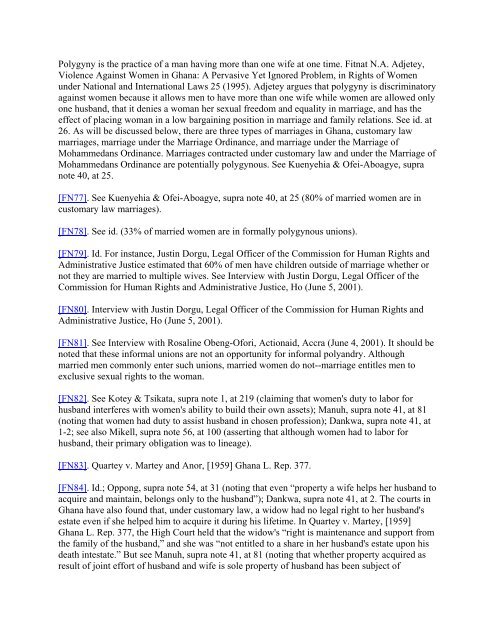Law, Culture and Women's Inheritance Rights in ... - Leitner Center
Law, Culture and Women's Inheritance Rights in ... - Leitner Center
Law, Culture and Women's Inheritance Rights in ... - Leitner Center
You also want an ePaper? Increase the reach of your titles
YUMPU automatically turns print PDFs into web optimized ePapers that Google loves.
Polygyny is the practice of a man hav<strong>in</strong>g more than one wife at one time. Fitnat N.A. Adjetey,<br />
Violence Aga<strong>in</strong>st Women <strong>in</strong> Ghana: A Pervasive Yet Ignored Problem, <strong>in</strong> <strong>Rights</strong> of Women<br />
under National <strong>and</strong> International <strong>Law</strong>s 25 (1995). Adjetey argues that polygyny is discrim<strong>in</strong>atory<br />
aga<strong>in</strong>st women because it allows men to have more than one wife while women are allowed only<br />
one husb<strong>and</strong>, that it denies a woman her sexual freedom <strong>and</strong> equality <strong>in</strong> marriage, <strong>and</strong> has the<br />
effect of plac<strong>in</strong>g woman <strong>in</strong> a low barga<strong>in</strong><strong>in</strong>g position <strong>in</strong> marriage <strong>and</strong> family relations. See id. at<br />
26. As will be discussed below, there are three types of marriages <strong>in</strong> Ghana, customary law<br />
marriages, marriage under the Marriage Ord<strong>in</strong>ance, <strong>and</strong> marriage under the Marriage of<br />
Mohammedans Ord<strong>in</strong>ance. Marriages contracted under customary law <strong>and</strong> under the Marriage of<br />
Mohammedans Ord<strong>in</strong>ance are potentially polygynous. See Kuenyehia & Ofei-Aboagye, supra<br />
note 40, at 25.<br />
[FN77]. See Kuenyehia & Ofei-Aboagye, supra note 40, at 25 (80% of married women are <strong>in</strong><br />
customary law marriages).<br />
[FN78]. See id. (33% of married women are <strong>in</strong> formally polygynous unions).<br />
[FN79]. Id. For <strong>in</strong>stance, Just<strong>in</strong> Dorgu, Legal Officer of the Commission for Human <strong>Rights</strong> <strong>and</strong><br />
Adm<strong>in</strong>istrative Justice estimated that 60% of men have children outside of marriage whether or<br />
not they are married to multiple wives. See Interview with Just<strong>in</strong> Dorgu, Legal Officer of the<br />
Commission for Human <strong>Rights</strong> <strong>and</strong> Adm<strong>in</strong>istrative Justice, Ho (June 5, 2001).<br />
[FN80]. Interview with Just<strong>in</strong> Dorgu, Legal Officer of the Commission for Human <strong>Rights</strong> <strong>and</strong><br />
Adm<strong>in</strong>istrative Justice, Ho (June 5, 2001).<br />
[FN81]. See Interview with Rosal<strong>in</strong>e Obeng-Ofori, Actionaid, Accra (June 4, 2001). It should be<br />
noted that these <strong>in</strong>formal unions are not an opportunity for <strong>in</strong>formal poly<strong>and</strong>ry. Although<br />
married men commonly enter such unions, married women do not--marriage entitles men to<br />
exclusive sexual rights to the woman.<br />
[FN82]. See Kotey & Tsikata, supra note 1, at 219 (claim<strong>in</strong>g that women's duty to labor for<br />
husb<strong>and</strong> <strong>in</strong>terferes with women's ability to build their own assets); Manuh, supra note 41, at 81<br />
(not<strong>in</strong>g that women had duty to assist husb<strong>and</strong> <strong>in</strong> chosen profession); Dankwa, supra note 41, at<br />
1-2; see also Mikell, supra note 56, at 100 (assert<strong>in</strong>g that although women had to labor for<br />
husb<strong>and</strong>, their primary obligation was to l<strong>in</strong>eage).<br />
[FN83]. Quartey v. Martey <strong>and</strong> Anor, [1959] Ghana L. Rep. 377.<br />
[FN84]. Id.; Oppong, supra note 54, at 31 (not<strong>in</strong>g that even “property a wife helps her husb<strong>and</strong> to<br />
acquire <strong>and</strong> ma<strong>in</strong>ta<strong>in</strong>, belongs only to the husb<strong>and</strong>”); Dankwa, supra note 41, at 2. The courts <strong>in</strong><br />
Ghana have also found that, under customary law, a widow had no legal right to her husb<strong>and</strong>'s<br />
estate even if she helped him to acquire it dur<strong>in</strong>g his lifetime. In Quartey v. Martey, [1959]<br />
Ghana L. Rep. 377, the High Court held that the widow's “right is ma<strong>in</strong>tenance <strong>and</strong> support from<br />
the family of the husb<strong>and</strong>,” <strong>and</strong> she was “not entitled to a share <strong>in</strong> her husb<strong>and</strong>'s estate upon his<br />
death <strong>in</strong>testate.” But see Manuh, supra note 41, at 81 (not<strong>in</strong>g that whether property acquired as<br />
result of jo<strong>in</strong>t effort of husb<strong>and</strong> <strong>and</strong> wife is sole property of husb<strong>and</strong> has been subject of


